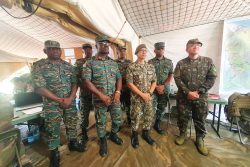The government yesterday used its majority in the National Assembly to pass a motion to permit Parliament to meet during the upcoming recess, in order to complete its legislative agenda.
But the opposition PNCR-1G and AFC both said they will not attend unless matters of national importance are being discussed.
The motion, which was in the name of Prime Minister Sam Hinds, called for the suspension of Standing Order No. 9, in order to allow the Parliament to continue to sit no later than or until September 27, 2011, when it is to be dissolved. Standing order 9 states that “unless there are special reasons for doing so, no sitting of the National Assembly shall be held between the 10th August and 10th October in any year. The 9th Parliament of Guyana held its first sitting on September 28, 2006, and in accordance with Article 70 (3) of the Constitution should be dissolved on 27th September, 2011.
Leading the debate on the motion, Hinds said that the government had brought the motion so they could complete the passage of several important laws. “We are not proposing this continuing of meetings of the Parliament lightly…but we have a number of bills which have been long in preparation and long in discussion and which we think would be a great loss to all of us, to the people of Guyana, if we do not conclude them within this Parliament,” Hinds said. He identified the Telecommunications Bill and the Public Utilities Commission (Amendment) Bill among the legislation that fit into this category. He noted that several bills remain in Special Select and Standing Committees, including the Access to Information Bill.
The government, Hinds said, was in no way trying to extend its term in office beyond the constitutional provisions.
He noted that the 9th Parliament had been extremely busy since it began its work and it has debated and passed 140 bills as of last Thursday.
“The PNCR totally rejects this high-handed and dictatorial bill,” Opposition Leader Robert Corbin said while making his contribution on
He added that the PNCR-1G would not be attending the sittings unless there is a matter of national emergency or importance. He said the government was trying to buy more time to complete the passage of legislation that it had failed to bring to the House in previous years. Corbin said that even if the bills are passed and assented to by the President, they would not be operational until after a new government is elected.
He also said that in the case where the ruling PPP/C loses the elections, the new administration would have to repeal the legislation.
He suggested that the government may be trying to enact certain pieces of legislation so that they could tap into the climate change funds from Norway.
Corbin also questioned the lack of consultation on the motion and said that such legislation should have been addressed by the Parliamentary Management Committee.
AFC MP Sheila Holder said that her party’s time would be better spent campaigning in the PPP’s constituencies.
“We will not allow the government benches to decide for us how we should spend our time during the recess and therefore we reserve the right when we will come into this House and if we will come into this House,” she said.
“If ever before there was any doubt about the willingness of this administration to encourage the members of this side of the House to be cooperative, this is a living example, that quite frankly they are disinterested in a harmonious National Assembly,” Holder said,
Government member Gail Teixeira refuted suggestions that the government had not consulted the opposition before bringing the motion to the House.
According to her, she had contacted the PNCR-1G Chief Whip Lance Carberry and indicated that the government was planning to work through the recess. Corbin had said that Carberry had only been contacted a few days ago on the matter.
Teixeira insisted that the government was not abusing or violating the constitution or the parliamentary standing orders.
She chided the opposition, particularly the PNCR-1G, for not seeing the opportunity that the additional period afforded them to have various concerns they might have addressed in the House.









